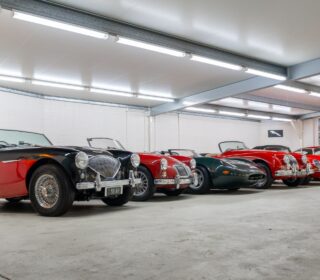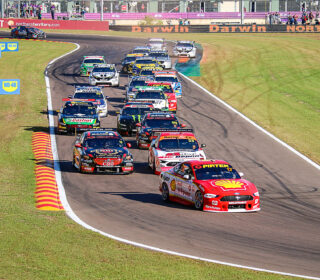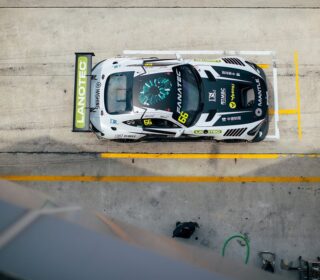THE BIG PICTURE: SEGAL ON SOCIAL

“The good thing about social media is that it gives everyone a voice. And the bad thing about social media is that it gives everyone a voice.”
So went my sage observation (I thought at the time) to a-then 10-year-old son about the pros and cons of social media.
By that comment I meant, of course, that while it’s fantastic that social media is a platform that gives everyone a voice, unfortunately, not everyone knows how to use that voice appropriately.
The memory of this piece of parenting came flashing back to me at Winton as the Supercar field prepared for the first race and I saw on the back of Alex Rullo’s helmet a message that read: “I (heart symbol) Haters”
I knew immediately the intent of the message … in that slightly awkward language typical of teenage boys, Alex was raising a middle finger to all those who criticise him on social media.
And he has a valid point.
Whether you think Rullo should be in the Supercar main game or not and whether you think he’s doing a good job or not, the social media attacks on Alex should not be personal.
Rullo is there because he wanted to live his dream and race Supercars, and to do so he needed to challenge a new license system that subsequently failed at its first test.
As has ever been the case since the beginning of time, money talks in motor racing.
Always has, always will.
Since the sport was invented, well funded young men and women have always made their way or got opportunities to progress through its ranks, because they had the necessary monetary means to support their ambitions.
Think back to the earliest days of motor racing in the first part of last century … the sport then was generally contested by wealthy individuals and/or benevolent patrons, people who could afford what has always been a ridiculously expensive sport.
Later, from the end of the ‘60s onwards, sponsorship levelled out the playing field a little and created chances that the not-so-wealthy might not otherwise have had to compete, but the sport’s reality is that money has always under-pinned opportunity, and that’s never going to change.
But just because a driver has money – be it from a wealthy family, a patron or sponsorship – doesn’t automatically mean they can’t drive, shouldn’t be out there racing or don’t deserve the opportunity to race.
To criticise Alex Rullo because of his background or relative lack of experience is to miss the point … I’d suggest, in fact, that the buck stops with CAMS.
After all it is CAMS, after some prompting from concerned Supercar teams and drivers last year, that introduced the new much-needed Super License system to protect our premier professional competition from the scenario where an inexperienced driver was able to step straight into the category.
Everyone seemed to agree at the time that it was a sensible step, indeed overdue, to ensure the quality and credibility of the Supercar field, and underline that it’s an aspirational category young Australian drivers should aim to be a part of.
So the Super License came into being at the start of 2017 and, lo and behold, the very first time the parameters that were required to be met to be granted a Super License were challenged, by Rullo, CAMS capitulated.
Again, don’t misunderstand, I am not making a judgement on Alex’s performances this year or doubting his sincerity about wanting to be a Supercars driver.
My point is that, at the time that he applied for a Super License, Rullo did not comply with the Super License criteria by its own measures, and therefore was seemingly not eligible.
To that point in his career, Alex had not had any notable success in Super2. That’s not criticism, just observation.
But what I am criticising is a process that allowed CAMS to fragrantly ignore both its own rules and the whole purpose of its own Super License system in the first place.
CAMS’ decision made a joke of the system. If the rules aren’t going to adhered to, then there’s no way of knowing in the future who is likely to be granted a Super License and who isn’t.
That has effectively rendered the Super License process hitherto completely redundant.
It’s a great shame because the Super License system makes sense … it was created to ensure that those drivers who get to Supercars have had the requisite success and experience that warrants them being there.
And it is also supposed to provide something that young drivers need to achieve to realise their Supercar ambitions.
As for the good and bad of social media, well, I used to joke that when they make me King, I will ban it.
True, that was a very old-school response to something I grappled to understand for a long time, I will readily admit now, and one that was born from the fact that it meant public comment was no longer the sole preserve of the media – now known as the ‘traditional media’.
That commentary was also driven by my offence at both the appalling English and the type of language used by some pundits, when commenting on line.
My position has mellowed somewhat since those early days of social media … I acknowledge now that it is here to stay and that, as per my original observation to my son, it does indeed give everyone a voice.
There are millions of people around the world who now have the ability to make comment in the public forum, to express themselves, and to trigger debate – something we are passionate about here at The Race Torque.
But equally, social media has been and, sadly, will always be, misused.
Literary concerns about the quality of what’s written on line aside – much of which would never, ever get a run in ‘traditional media’ because of its poor spelling and grammar – what offends me most is the inappropriate language and personal criticism that’s levelled by some keyboard warriors.
It seems some people have no filter or perhaps, giving them the benefit of the doubt, don’t understand the damage that their offensive comments or negativity can wreak on the individual being targeted … in our motor racing world I have seen some truly appalling and deeply personal comments made on line, the nature of which just stagger me.
Like I said at the start of this conversation, the worst thing about social media is also that it gives everyone a voice … it’s a great shame that not everyone knows how to give voice to their opinion without turning to abuse or obscenity.
Those years ago, when I talked to my son about social media, I added a rider to the conversation that I think is as relevant today as it was back then …
“You should never put something on social media about someone that you aren’t be prepared to say to their face.”
WORDS: David Segal
David Segal is perhaps best known to current motor sport fans as the long-time manager of current Supercars Championship stars Craig Lowndes and Will Davison, and Super 2 Championship front runner Jack LeBrocq. A 30-year absence from Journalism ends this year with David’s ‘The Big Picture’ column here on The Race Torque.














